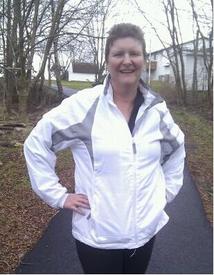Confused by what I am being told, Burned cal

ekim724
Posts: 37 Member
I was adding a walk I just did to MFP but I am now confused.
I bought a hart rate watch that I used th first time today. I entered into my watch my age 32, weight 419 (last weight in) and started the exercise mode when i started walking, I walked for 60 min and covered 3 miles (according to Google maps) with my hart rate highest 141BPM {top of hill} to lowest of 115BPM {walking on flat after hill}. my watch said I burned like 1500 cal.
Now I entered 60min walk at 3mps into MFP and it said i only burned 628Cal.
So why is there such a differences? and which do I log?
I bought a hart rate watch that I used th first time today. I entered into my watch my age 32, weight 419 (last weight in) and started the exercise mode when i started walking, I walked for 60 min and covered 3 miles (according to Google maps) with my hart rate highest 141BPM {top of hill} to lowest of 115BPM {walking on flat after hill}. my watch said I burned like 1500 cal.
Now I entered 60min walk at 3mps into MFP and it said i only burned 628Cal.
So why is there such a differences? and which do I log?
0
Replies
-
I have a similar problem. My gym equipment with heart rate monitors say I burn quite a bit less than MFP says. So kind of the opposite of yours. The equipment asks for my age and weigt too. I usually just settle for somewhere in between them haha. I'm interested in some other answers0
-
I am not sure but I think MFP numbers are base on walking on flat surface...my HRM is higher then MFP. ..I walk up and down hills . And for me a 5 miles walk (100 mins) up and down hills is around 1211.0
-
I too am confused, although I dont put my age on the machine at the gym. My heart rate watch is normally higher than what my bike says in cycling, yet its closer to machines like the treadmill or elliptical. I wish I knew for sure if my watch was right. And almost always MFP has a way higher calories burned than my watch has.
I wonder if the fitbit is any better than our watches? I like my watch because I put a belt like monitor around my rib cage close to my heart, so I would think it is more accurate? Ug0 -
Different people will burn more or less calories depending on how difficult an exercise is for them. That's why heart rate monitors (HRM) are so helpful. If someone does a lot of running, then their muscles are going to be more efficient than someone who just started walking. They won't burn nearly as many calories and it will feel easier and their heart rate will be lower. Some people may have only burned 600 calories, but since it required more effort from you, you burned a lot more.
Another factor is body weight. If someone weighs 100 lbs and walks for an hour, they aren't having to propel as much weight forward as someone who is 200 lbs. It's harder for a heavier person to move themselves than for a lighter person, just because there's more body mass. Again, heavier people will then burn more calories.
The calculator on MFP is a sort of average of what the exercise might burn for people. Since every person is different and there are so many factors, your HRM is much more accurate and you should go by that. (-:
Good for you for doing so much work!!0 -
Different people will burn more or less calories depending on how difficult an exercise is for them. That's why heart rate monitors (HRM) are so helpful. If someone does a lot of running, then their muscles are going to be more efficient than someone who just started walking. They won't burn nearly as many calories and it will feel easier and their heart rate will be lower. Some people may have only burned 600 calories, but since it required more effort from you, you burned a lot more.
Another factor is body weight. If someone weighs 100 lbs and walks for an hour, they aren't having to propel as much weight forward as someone who is 200 lbs. It's harder for a heavier person to move themselves than for a lighter person, just because there's more body mass. Again, heavier people will then burn more calories.
The calculator on MFP is a sort of average of what the exercise might burn for people. Since every person is different and there are so many factors, your HRM is much more accurate and you should go by that. (-:
Good for you for doing so much work!!
Thank you I was kinda thinking that but want sure and kinda new to this whole thing so I thought I would ask, I add what my watch said into MFP. And thanks to everyone else that has replayed.0 -
Does your HRM have a chest strap? those tend to be more accurate than just the watch ones. Also if you have a smart phone look up teh app called runkeeper. It works with google maps to log distance and changes in altitude along with speed to calculate calories burned. Although it doesn't log HR it does always seem to be round about the same for me as MFP calculations0
-
Does your HRM have a chest strap? those tend to be more accurate than just the watch ones. Also if you have a smart phone look up teh app called runkeeper. It works with google maps to log distance and changes in altitude along with speed to calculate calories burned. Although it doesn't log HR it does always seem to be round about the same for me as MFP calculations
No my watch doesn't have a chest strap it has a sensor on the side where you hold your finger up to. And I will look that app up hopefully its in the android market, I am as of right now just going with the middle number of the two (watch / MFP).0 -
In this case, MFP is likely the more correct number. There are a couple of qualifying factors: A) terrain--a lot of uphill walking can add a few more calories;
 your weight. At your weight there is added work over and above what one would calculate just based on the scale alone. Put those two together, and you might end up with an actual number 5%-15% above the MFP number, but still a lot less than the HRM. The HRMs with touch sensors, I believe, tend to assume that whatever heart rate it sensed the last time was what you maintained the entire time between sensor touches.
your weight. At your weight there is added work over and above what one would calculate just based on the scale alone. Put those two together, and you might end up with an actual number 5%-15% above the MFP number, but still a lot less than the HRM. The HRMs with touch sensors, I believe, tend to assume that whatever heart rate it sensed the last time was what you maintained the entire time between sensor touches.
I wouldn't get too hung up on that. It's fantastic that you are getting out and moving. Right now, you really don't need to worry about "eating back" your exercise calories. As long as you are eating 1800-2200 that should be sufficient--you can run bigger deficits than most people.
Keep up the good work and keep moving!0 -
I was adding a walk I just did to MFP but I am now confused.
I bought a hart rate watch that I used th first time today. I entered into my watch my age 32, weight 419 (last weight in) and started the exercise mode when i started walking, I walked for 60 min and covered 3 miles (according to Google maps) with my hart rate highest 141BPM {top of hill} to lowest of 115BPM {walking on flat after hill}. my watch said I burned like 1500 cal.
Now I entered 60min walk at 3mps into MFP and it said i only burned 628Cal.
So why is there such a differences? and which do I log?
ofcourse.... it counts your metabolism calories too... i think.... i think it counts BMR too.0 -
MFP doesn't consider your weight. It tends to be too high a calorie burn estimate for those with lower weights. Even HRM are an estimate and some are better than others.0
-
Something to keep in mind is that heart rate monitors are not designed to calculate calories when you are below your target heart rate zone (My minimum is 135 about). If you are not in your zone, the calorie count is way too high because the formula is not meant to calculate extrapolated data (data outside of your target zone). I would say go with what MFP says.0
-
I'd use the HRM. It twas reading you -your age, weight and effort as determined by your heart rate - not some average assumed effort. I'd also do the walk again tomorrow and see if you get the same reading! Possible something is off. If its the same then I'd take it at face value and always use the HRM to determine calories burned from exercise.0
-
When this happens to me I take the lower number, just in case the higher one is wrong I don't want to over eat (if that makes sense)
However, since I do this, I don't get angry at myself if I go a little over my calories that day since I probably burned a bit more than I logged.0 -
Just my opinion, but I think MFP is just an estimate because everybody burns calories different, so there is no way that MFP can be totally accurate, but I think they get fairly close to accurate.0
-
I agree with azdak
The touch sensors are not as accurate I had one and it gave me crazy high calorie burns when I ran. Double what everything else was saying. I also agree that it is awesome you are getting out there and any exercise will be beneficial!! Keep rocking it!!!0 -
MFP numbers are typically on the high side. I would go with the 600 calories, but I think that is on the high side as well.
I have no doubt that 1500 calories from your watch is wrong.
As has been said before the watches without the chest strap are not accurate.0 -
Thats why they sell heart rate moniters. Because no 2 people are going to be exactly the same. This site is giving you a generic reading from an avg. It doesn't take in consideration your age, weight, gender. It has no ideal if there are hills or flat surfaces etc... For some the amount they are burning is going to be way less than what this site gives credit for and for others it will be way off in the other direction. It is the same thing however for those people that are relying on a heart rate moniter that does not have a chest strap, it is just guesstimating based on what your heart rate is at the time you touch the little sensors, and that can vary greatly from one second to the next.0
-
Does your HRM have a chest strap? those tend to be more accurate than just the watch ones. Also if you have a smart phone look up teh app called runkeeper. It works with google maps to log distance and changes in altitude along with speed to calculate calories burned. Although it doesn't log HR it does always seem to be round about the same for me as MFP calculations
No my watch doesn't have a chest strap it has a sensor on the side where you hold your finger up to. And I will look that app up hopefully its in android market, I am as of right now just going with the middle number of the two (watch / MFP).
honestly the monitors without a chest strap are junk and so are the apps. The only way to really gauge is to get a heart rate monitor with a chest strap. My Fitness only averages out what you may burn but has no idea how hard you actually went. Buy a new monitor and don't waste time with the apps etc.....0 -
Hi
That walk was probably hard work for your bodyweight - I know I would not be able to do it - well done.
I weigh 270lbs and have a Suunto heartrate monitor (with belt) and walked 5km (3mile) last weekend which took me 1 hr 12 mins.
You walked hills which would be harder work again plus you are a lot heavier than me. Bear in mind also that the heartrate monitor also includes your RMR (calories need just to live) and for me this means I deduct about 1 cal per minute from the HRM calorie burn.
I also use a **heartrate based calories burned calculator** to check on my HRM figures and find this really useful - it also includes a field for your V02max score as well. If you Google V02max calculator you will find various tools to help you calculate yours.
http://www.triathlontrainingblog.com/calculators/calories-burned-calculator-based-on-average-heart-rate/
This calculator estimated approx 1260 calories burned for your weight and average heartbeat - I guessed age at 45.
Hope this helps0 -
The HRMs with touch sensors, I believe, tend to assume that whatever heart rate it sensed the last time was what you maintained the entire time between sensor touches.
I wouldn't get too hung up on that. It's fantastic that you are getting out and moving. Right now, you really don't need to worry about "eating back" your exercise calories. As long as you are eating 1800-2200 that should be sufficient--you can run bigger deficits than most people.
Keep up the good work and keep moving!
My first purchase was a "touch based" HRM and the previous poster was spot on with this comment. I had some crazy burns with that thing but upgraded to a polar model with chest strap and the first time I used it, I tried both units. The touch one was more than double the polar and the polar was about 10% less than MFP.0 -
chest strap HRM are your best bet, New Balance is a GREAT and cheaper alternative, but you can go the Polar route as well. either way, you get good quality and a comfortable chest strap, cloth. more accurate0
-
When in doubt I always go with the lower number.0
-
Something to keep in mind is that heart rate monitors are not designed to calculate calories when you are below your target heart rate zone (My minimum is 135 about). If you are not in your zone, the calorie count is way too high because the formula is not meant to calculate extrapolated data (data outside of your target zone). I would say go with what MFP says.
How do you know your target heart rate?0
This discussion has been closed.
Categories
- All Categories
- 1.4M Health, Wellness and Goals
- 398.2K Introduce Yourself
- 44.7K Getting Started
- 261K Health and Weight Loss
- 176.4K Food and Nutrition
- 47.7K Recipes
- 233K Fitness and Exercise
- 462 Sleep, Mindfulness and Overall Wellness
- 6.5K Goal: Maintaining Weight
- 8.7K Goal: Gaining Weight and Body Building
- 153.5K Motivation and Support
- 8.4K Challenges
- 1.4K Debate Club
- 96.5K Chit-Chat
- 2.6K Fun and Games
- 4.8K MyFitnessPal Information
- 12 News and Announcements
- 21 MyFitnessPal Academy
- 1.6K Feature Suggestions and Ideas
- 3.2K MyFitnessPal Tech Support Questions

















